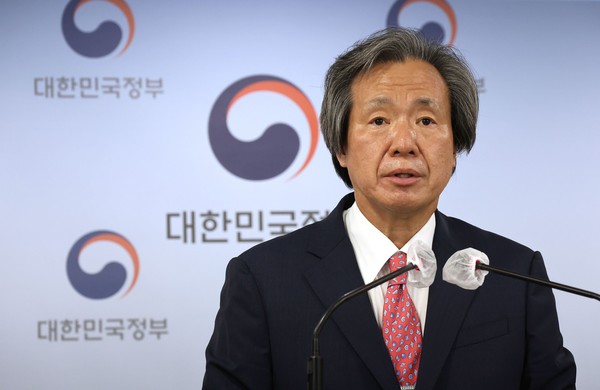Korea's top quarantine advisor said the nation should keep face masks indoors for at least three months.

"After about three more months, Koreans won't have to stress too much about the indoor mask," said Jung Ki-suck, head of the National Advisory Committee on Infectious Disease Crisis Response, during a press briefing on Monday.
Jung's comment comes after the government lifted all outdoor mask mandates as part of an effort to support people's return to normalcy, but decided to continue to enforce indoor mask wearing rules in September.
However, Jung emphasized that even if the global community declares the end of the Covid-19 pandemic, it will take some time before removing face masks in certain places, such as public transportation and medical institutions.
"Regardless of the place or time, I think the government can boldly lift indoor mask duty only when it judges that it is safe off the masks despite risks," Jung said. "The advisory committee, the Ministry of Health and Welfare, and the Korea Disease Control and Prevention Agency are continuing to discuss whether to lift indoor masks, but considering the high outdoor mask wear rate and the risk of the upcoming seventh viral wave of COVID-19 during the winter season, it is difficult to reach a conclusion."
Even if the infection increases, the government may consider lifting indoor masks if no one dies from Covid-19 and if patients can receive treatment without any problems, but this is not yet the case, Jung added.
Jung emphasized that the scientific basis for lifting the indoor mask duty is not yet solid.
"Notably, when the mandatory indoor mask is lifted, the risk of severe and death may increase for young children and the elderly," Jung said. "The government is also bracing for a possible outbreak of a twindemic of Covid-19 and seasonal influenza this winter."
Therefore, it is crucial that elderly people and other vulnerable groups receive booster vaccination, Jung added.
On Monday, Korea added 14,302 new Covid-19 infections, including 56 cases from abroad, bringing the total caseload to 25,311,636, according to the KDCA.
It is the first time in a week that the daily count fell below 15,000. However, the caseload on Monday is still higher compared to a week ago.
The health authorities have warned of the resurgence in infections around December, and some experts said the country would experience a fresh wave as early as November.
The nation also reported 10 more Covid-19 deaths, raising the death toll to 29,000. The fatality rate stood at 0.11 percent. The number of critically ill patients came to 226, up 14 from the previous day.
According to the KDCA, about 44.68 million among 52 million Koreans have been fully vaccinated. In addition, about 33.63 million people had received their first booster shots, and 7.51 million had their second booster shots.

